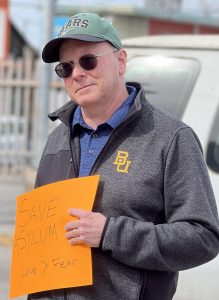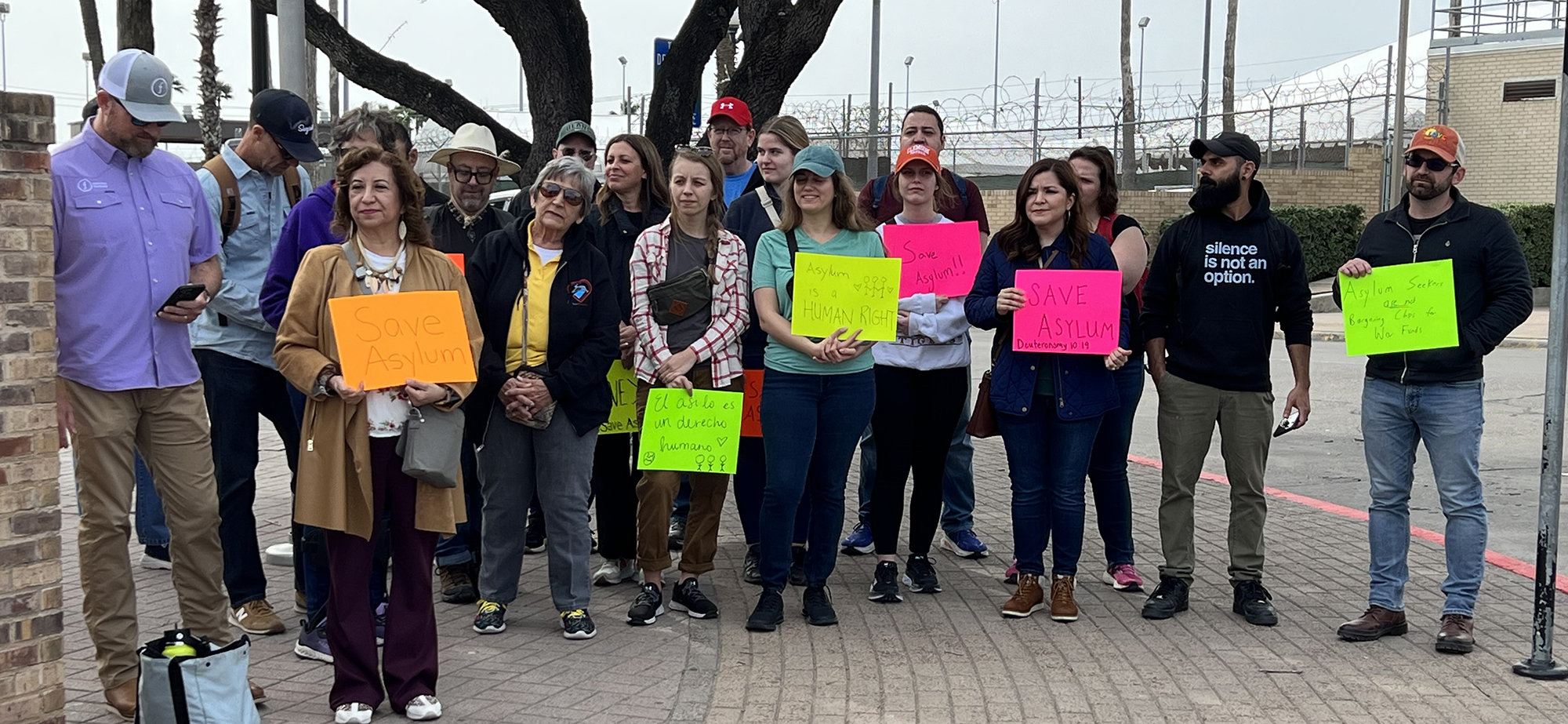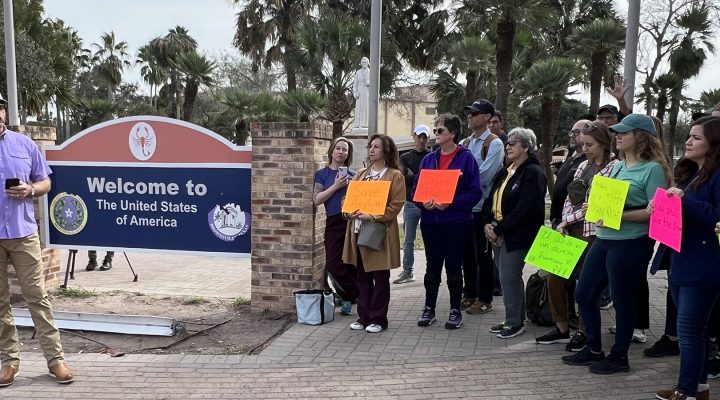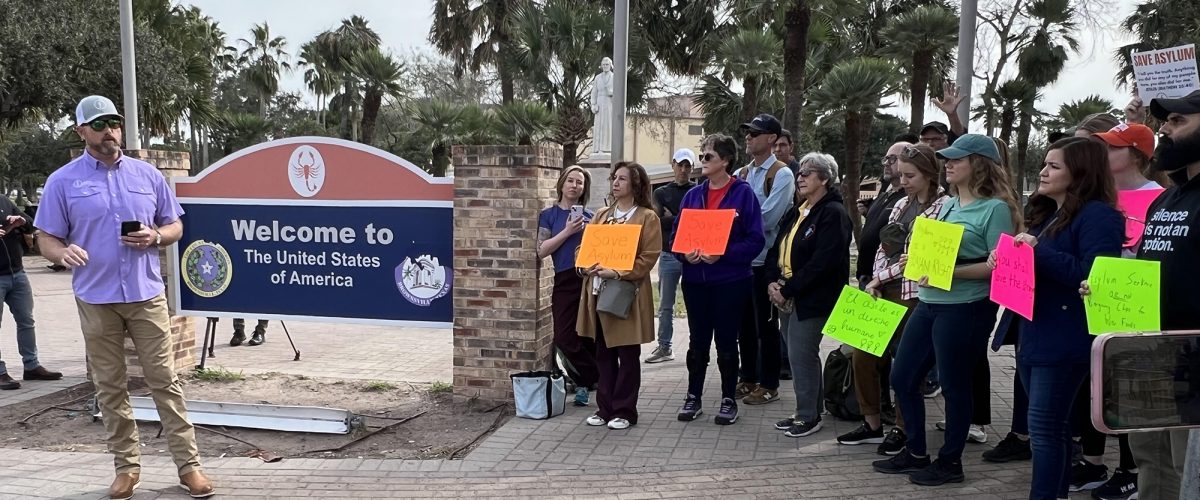A procession of ecumenical walkers supporting asylum rights offered prayers and solidarity for migrants and a shot in the arm for weary immigration advocates last weekend at the Texas-Mexico border.
“It was encouraging to my faith and to my work to know we can come together for something so important,” said Anyra Cano, programs and outreach director at Fellowship Southwest and organizer of the Jan. 13 walk in solidarity for life and asylum.
The event included a prayer rally, talks urging U.S. politicians to preserve and improve the nation’s asylum system and a march over the bridge from Brownsville, Texas, to Matamoros, Mexico, to visit a camp for migrants awaiting entry into the United States.
The walk was co-sponsored by Catholic Charities of the Rio Grande Valley, Fellowship Southwest and the Practice Mercy Foundation, and drew participants from states like Massachusetts, North Carolina and South Carolina and from communities across Texas.

Lance Mayes, associate pastor of Woodland Baptist Church in San Antonio.
“We had educators, pastors, nonprofit leaders, lay leaders, people who are in education and higher education. Even the theological backgrounds were very different. It was neat to see this diverse group of people come together because they care and wanted to stand with the migrant community and raise their voices to save asylum,” said Cano, who also serves as board chair for Baptist Joint Committee for Religious Liberty.
One of the primary goals of the gathering was to pray for the safety of migrants who are often victimized in their home countries, during their journeys north and at the U.S.-Mexico borer, said Stephen Reeves, executive director of Fellowship Southwest.
Another objective was to send a message to Congress and to the Biden administration to reject harsh restrictions to the asylum process.
“We are concerned by reports that border security negotiations could end up curtailing the ability of those who need to seek asylum,” Reeves said. That would happen if the White House agrees to Republican efforts to add asylum restrictions to a foreign aid bill the president wants for Ukraine, Israel and Taiwan.
Advocates are frustrated that government leaders are negotiating about border security and asylum in isolation from the larger issue of a dysfunctional U.S immigration system, Reeves said. “Those things are issues because our system of legal immigration is so broken and outdated and unresponsive to the need.”
That need includes a surge of migrants, motivated by hunger and economic hardship, who are applying to an asylum system designed for those seeking protection from persecution in their native countries. A pathway to legal immigration for those seeking relief from hunger and poverty is missing, Reeves said.

Supporters of Fellowship Southwest join others in preparing to walk across the bridge from Brownsville, Texas, to Matamoros, Mexico, Jan. 13.
“We need to be talking about farmworker visas, the Farm Workforce Modernization Act, and about what we need for employment in this country,” he said. “But all that is being ignored at the moment.”
Also overlooked are potential U.S. contributions to preventing migration at its origins, he said. “Certainly, increasing aid to the countries where people are coming from might impact that problem. But we are not talking about aid packages for the hungry and persecuted in Central America.”
The problems plaguing U.S. immigration are solvable but won’t be fixed as long as both parties see political gain in the chaos around immigration, Reeves added. “We can’t let politicians or anybody else get away with simply discussing the border or asylum and not putting it in the broader context of immigration.”
It’s also important that Texas Gov. Greg Abbott not get away with recent comments suggesting violence against immigrants, he said.
“The only thing we aren’t doing is shooting people who come across the border because the Biden administration would charge us with murder,” Abbott said during a Jan. 5 radio program.
Reeves blasted the statement as dehumanizing and despicable and said Abbott will be responsible if it inspires violence against asylum seekers and others crossing the border.
The solidarity walk was designed in part to push back against the hateful mentality on display in Abbott’s remark, he said. “It does play into the mistaken narrative that people are trying to come into the U.S. to do harm or are simply coming because they need a few more dollars per hour. I think that’s where you get the mentality that anyone coming to our border is wrong and has nefarious intent.”
The result of that mindset is a dehumanizing rhetoric, from Abbott and others, that migrants are not only unworthy of asylum but that they should be treated like criminals because they are not human beings, Reeves said.
“The choices before our nation and that our lawmakers have in their hands are choices between life and death.”
“To present yourself for asylum is a legal process. The United States has been committed to upholding the right of asylum for decades. There is no doubt that our system of asylum was never constructed to process folks at the numbers they are receiving now. But the answer is not violence, but to reform our process and strengthen it and give the resources necessary to handle the new reality of asylum seekers.”
The weight of these issues was on the minds of walkers as they journeyed into Mexico to meet with migrants, said Elket Rodriguez, Cooperative Baptist Fellowship field personnel and Fellowship Southwest partner.
“The message was timely,” he said. “The choices before our nation and that our lawmakers have in their hands are choices between life and death. We should not forget the fact that ongoing negotiations in Congress about border security are just that.”
Those who ventured over the bridge into Matamoros were uplifted by getting to meet the migrants they support from the U.S. side of the border, Cano said. “The vibe I got was that everybody was excited to meet their neighbors. For Fellowship Southwest, it was encouraging to see that we can partner with others who practice mercy.”


